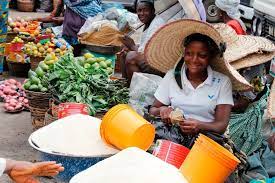Opinion – War Against Hunger: A Call For Collective Action
Articles/Opinion, Featured Contributors/Columnists, Latest Headlines Sunday, February 25th, 2024
By Tosin Kolade, (NAN)
(AFRICAN EXAMINER) – “A hungry man is an angry man”, according to James Howell, a Welsh writer and historian. This timeless quote is resonating in some parts of Nigeria.
Some citizens are taking to the street to protest against some government policies which they allege are exacerbating hunger. What started in Minna, Niger, has spread to Ibadan, Lagos, Osun and Kano.
In Ibadan, the protesters commenced their march from the Mokola axis carrying placards with messages such as “End food hike and inflation,” “Insecurity not our birthright,” and “Mr President, this is not the hope, this is shege.”
They also chanted songs to show their grievances as armed policemen stood by to ensure the protesters conducted themselves within the ambits of the law.
There is a video currently circulating in the social media showing Nigerians looting a truck carrying farm produce.
This is akin to what happened in Venezuela, a country hit by acute economic hardship, as angry citizens forcefully entered shops and looted food items.
President Bola Tinubu’s decision to end the petrol subsidy regime on May 29, 2023, has triggered soaring food prices.
However, figures from World Food Programme indicate that Nigeria is not alone in this situation.
It says that in the 78 countries it operates, over 333 million people face acute food insecurity, unsure of where their next meal will come from.
The recent warning from the African Development Bank (AfDB) about potential unrest in Nigeria, coupled with rising living costs due to fuel subsidy removal and naira devaluation, adds urgency to the situation.
According to the AfDB, similar challenges in other African nations like Angola, Ethiopia, and Kenya could lead to internal conflicts and violence.
Similarly the Nigerian Red Cross Society (NRCS) sounded an urgent alarm, declaring that the country’s hunger crisis has reached a critical state.
Mr Abubakar Kende, the Secretary General of NRCS, emphasised the need for immediate attention and collective efforts to alleviate the suffering of vulnerable individuals.
While expressing deep concern about the escalating food insecurity in Nigeria, Kende called for decisive action from the government.
During the launch of a partnership between the Red Cross and Ecobank in Abuja, he highlighted the impact of rising fuel prices, leading to hyperinflation and pushing food prices beyond the means of many Nigerians.
Kende said that approximately 26.5 million Nigerians, including women and children, are currently facing acute hunger, urgently requiring assistance to prevent death and prolonged suffering.
He stressed that over half of Nigeria’s 36 states were food insecure, with the hunger crisis reaching alarming levels due to increased insecurity, inflation, extreme weather patterns, and global conflicts.
The Red Cross move collaboration with Ecobank aims to mobilise local resources to address the pressing hunger crisis, signaling the critical need for swift and coordinated action to mitigate the dire situation.
Worried by the impact of the situation on workers, the Nigeria Labour Congress (NLC) announced that there would be a two-day nationwide protest on Feb. 27 and 28.
The labour body highlighted the pressing need for collective action to address the escalating food crisis and the challenges faced by citizens in the wake of economic reforms.
But the Federal Government is not relenting in its efforts to mitigate the impact of its economic reforms on the citizens.
On Feb. 6, the Presidential Committee on Emergency Food Intervention convened at the Presidential Villa in Abuja to address the escalating cost of living in the country.
Under the chairmanship of Mr Femi Gbajabiamila, Chief of Staff to the President, the meeting had in attendance key figures such as Nuhu Ribadu (National Security Adviser).
Also in attendance were Yemi Cardoso (Central Bank of Nigeria governor), AlhajiTahir Mamman (Minister of Education) and Mr Wale Edun (Minister of Finance).
Others are Abubakar Kyari (Minister of Agriculture), along with Mustapha Shehuri (Minister of State for Agriculture).
Following the meeting, President Bola Tinubu, on Feb. 8, directed the immediate release of 42,000 metric tons of assorted food items from strategic reserves and the Rice Millers Association of Nigeria as a short term measure the address the challenge.
Alhaji Abubakar Kyari, the Minister of Agriculture and Food Security, has also assured that the federal government was committed to ensuring that the released grains reach impoverished Nigerians.
Collaborating with the National Emergency Management Agency (NEMA) and the Department of State Services (DSS), the Ministry of Agriculture is actively working to determine the recipients and locations for the distribution of these food items, he said.
Kyari said these efforts were in line with the broader agenda set during the first federal executive council meeting.
He said the agenda focused on food security, poverty reduction, economic growth, job creation, access to capital, inclusivity of women and youth, and addressing corruption and insecurity.
He clarified that the ministry’s blueprint includes immediate, short-term, medium, and long-term plans.
While the authorities are working round the clock to save the situation, insecurity seems to be putting spanner in the works.
This has prompted the National President of the All Farmers Association of Nigeria, Alhaji Kabiru Ibrahim, to urge farmers to establish vigilant groups to protect themselves amid increasing insecurity.
According to him, while the North faces concerns about bandit attacks, the South-West grapples with the herder-farmer crisis, and the South-East attributes insecurity to the proscribed Indigenous People of Biafra.
He cited the case of Zamfara where bandits allegedly take control of farms, demand access levies from farmers.
Ibrahim underscored the importance of farmers taking proactive measures to secure their farmland, stressing that the nation’s food production system is under severe strain.
Addressing the challenge, experts say, require a collective not only among Nigerians but also across Ministries, Departments and Agencies.
An Economist, Dr Sam Idaho, says for instance Ministry of Humanitarian Affairs mandates should include interventions to boost food production, distribution, and support to communities affected by hunger crisis.
Idaho highlighted the necessity for a comprehensive middle and long-term strategies, advocating investments in sustainable agricultural practices.
He said the intervention should also include the promotion of technology-driven farming, and the implementation of policies that address the root causes of the food crisis.
He recommended the establishment of an appeal fund, mobilising financial resources from both domestic and international sources to effectively combat the hunger crisis.
This fund, he said, could be utilised as emergency relief and long-term sustainable initiatives.
Experts say that developing state-specific agricultural plans, addressing local challenges, and collaborating with communities are essential in Nigeria’s battle against the hunger. (NAN Features)
Related Posts
Short URL: https://www.africanexaminer.com/?p=94081






















